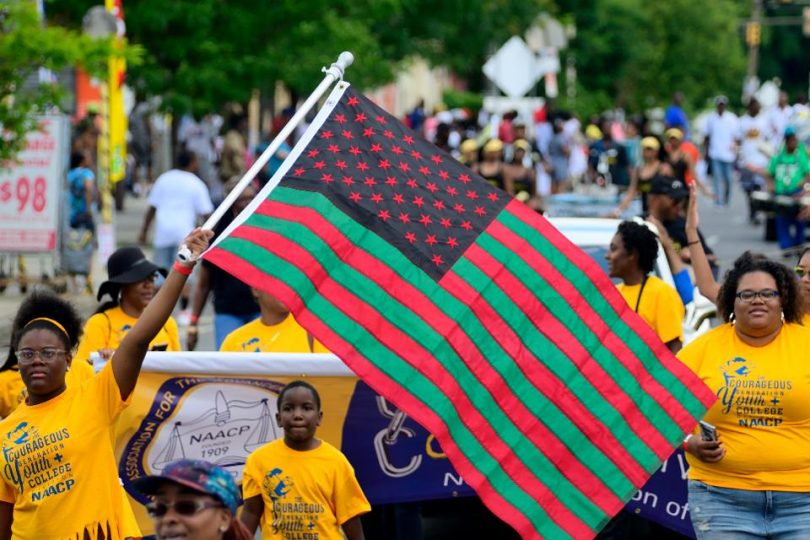No More Excuses — It’s Time To Declare Juneteenth A Federal Holiday
The wave of protests sweeping the United States in the aftermath of the deaths of George Floyd, Breonna Taylor, and Ahmaud Arbery have propelled the country into a dramatic moment of self-examination. Americans, especially white Americans, are now grappling with the troubling recognition that systemic racism and racial inequality are true hallmarks of their nation. While many overdue measures are needed to address the painful consequences of America’s long affliction of racism, there is one gesture that would not only demonstrate America’s recognition of its past, but also its commitment to the future of its Black citizens.
It is finally time to declare Juneteenth, also referred to as Emancipation Day, a federal holiday.
For those unfamiliar with its history, June 19, 1865, commonly referred to as Juneteenth, is the date that the Union Army’s Major General Gordon Granger arrived in Galveston, Texas and announced the end of both the Civil War and slavery. The declaration came almost two and a half years after President Abraham Lincoln announced the Emancipation Proclamation, which freed all slaves in the Confederacy. The two and a half year delay was due, in part, to the fact that Texas was the western most slave-holding state and saw only limited battles and Union troops. This meant that few slaves in Texas were aware of President Lincoln’s declaration, as well as their freedom. Subsequently, legal freedom for all enslaved people in the United States came with the end of the Civil War and the passage of the 13th Amendment to the U.S. Constitution.

Elected officials, community leaders, youth and drum and marching bands take part in the second … [+]
NURPHOTO VIA GETTY IMAGES
Starting in 1866, Texans began marking Juneteenth as a day of celebration and community, memorializing the day with prayer, learning, and family celebrations – also often accompanied by parades and performances. It was not uncommon for communities to purchase land for Juneteenth celebrations like, for example, Emancipation Park in Houston, Texas. As Texans spread across the country, so did Juneteenth celebrations, which became commonly known as America’s second Independence Day. On January 1, 1980, Juneteenth became an official Texas State holiday.
As of today, 46 states and the District of Colombia recognize Juneteenth in some capacity as a holiday or official observance. But despite the regular recognition of Juneteenth by Congressional resolutions and executive orders, its declaration as a federal holiday has remained elusive.
It’s time for that to change.
If the past several weeks have taught us anything, it is that far too few Americans, particularly white Americans, have a true understanding of both the history of the Black community in their country, as well as the relentless systems of racism and oppression that impact every aspect of Black Americans’ lives. Despite generations of efforts being made to identify and address disparities in income, health, safety, and access to fundamental rights many Americans take for granted, far too few of the nation’s citizens feel a sense of shared ownership and obligation to answer the call. Equally, even as the number of people who are willing to stand up and say Black Lives Matter grows, still far too few know how to take tangible steps to make that commitment a reality.
Which is why making Juneteenth a federal holiday is both urgent and necessary.
The nation needs a day not just to honor and celebrate what many refer to as America’s second Independence Day, but it also needs a moment when each and every person can stop and reflect on the work that is yet to be done. A Juneteenth federal holiday would be more than a “day off,” but one filled with educational experiences about the institution and affliction of slavery, community conversations on race and reconciliation, and cultural experiences that bring the history, challenges, and contributions of Black Americans to the forefront of the nation’s consciousness. For those who celebrate it, Juneteenth already is already both a stirring and inspiring moment that deepens their connection with Black America’s past as well as with one another. Why shouldn’t we establish that opportunity for all Americans as well?
To be clear, naming Juneteenth a federal holiday recognized by all of the states in the nation would be a strong gesture, rich with symbolism and possibility. But it wouldn’t be enough. The nation needs to make dramatic policy changes at every level of government to address the systemic and racist inequities that have haunted it since its founding. Equally, business, cultural, and sports institutions also need to reflect and redress their similar shortcomings. Simply naming Juneteenth a holiday isn’t enough. The spirit of the holiday needs to be expressed every single day through policy and action.
Some will argue that encouraging the actions like those taken by Apple, Twitter, the N.F.L, and other private companies to provide a day of paid leave for Juneteenth is the better approach. Others may claim that naming a federal holiday is too expensive for a country that already has too many holidays. But those arguments beg two troubling questions: why try to place the responsibility of an entire nation to do what’s right on private companies? And why debate the cost of a day that commemorates a price that has already been deeply paid by generations of Black Americans for over 400 years?
Nikole Hannah-Jones, the Pulitzer-Prize winning journalist for The New York Times, and creator of the award-winning 1619 Project, recently stated it best: “That the US doesn’t have an Emancipation Day to mark our abolishing an institution antithetical to our founding ideals of freedom & liberty speaks to the ongoing cover-up and our inability, still, to acknowledge what we did and who we are,” Hannah-Jones tweeted. “Juneteenth should be a national holiday.”
In a moment when America is facing deep divisions on almost every issue imaginable, Juneteenth provides an opportunity for all Americans acknowledge, together, the past, present, and future of America’s Black community. It took over two and half years for the men and women who were enslaved in Texas to learn that they had been freed. With that in mind, we can not wait another moment to create a day that all Americans can dedicate to demonstrating that the legacy of emancipation is not only an aspect of history, but also a call to action. Making Juneteenth a federal holiday would help do exactly that.
And just like that day in June of 1865, it is long overdue.








